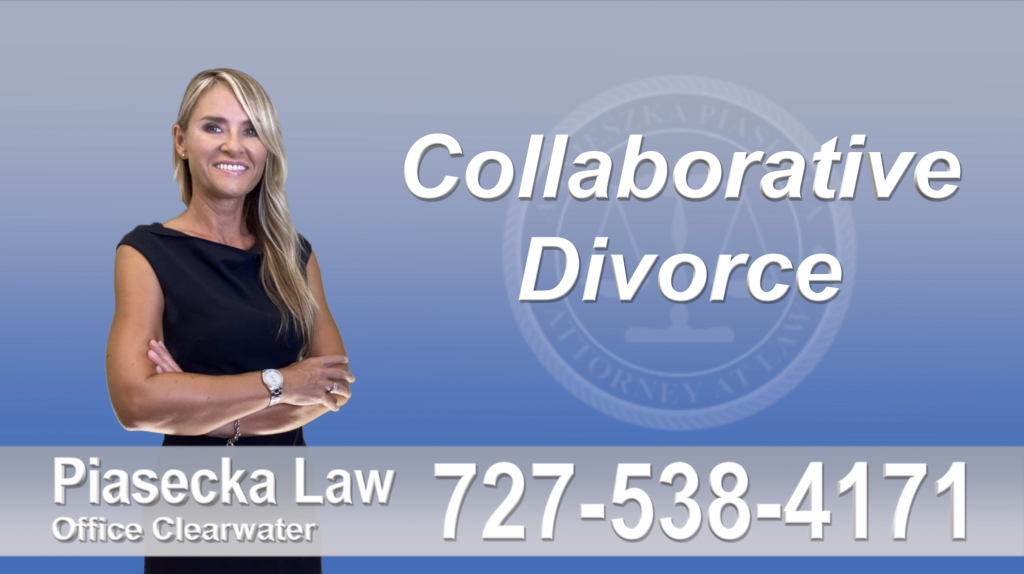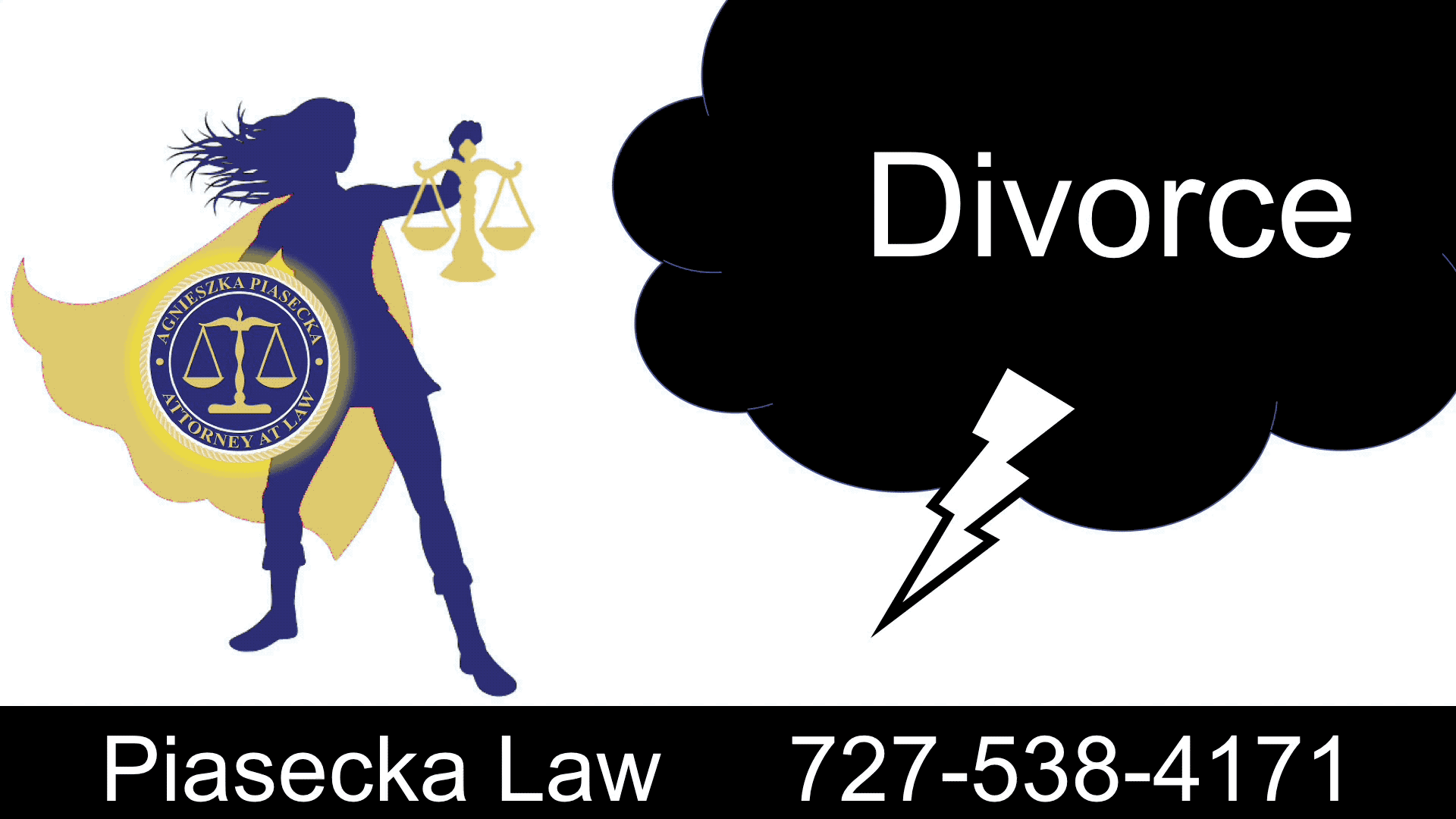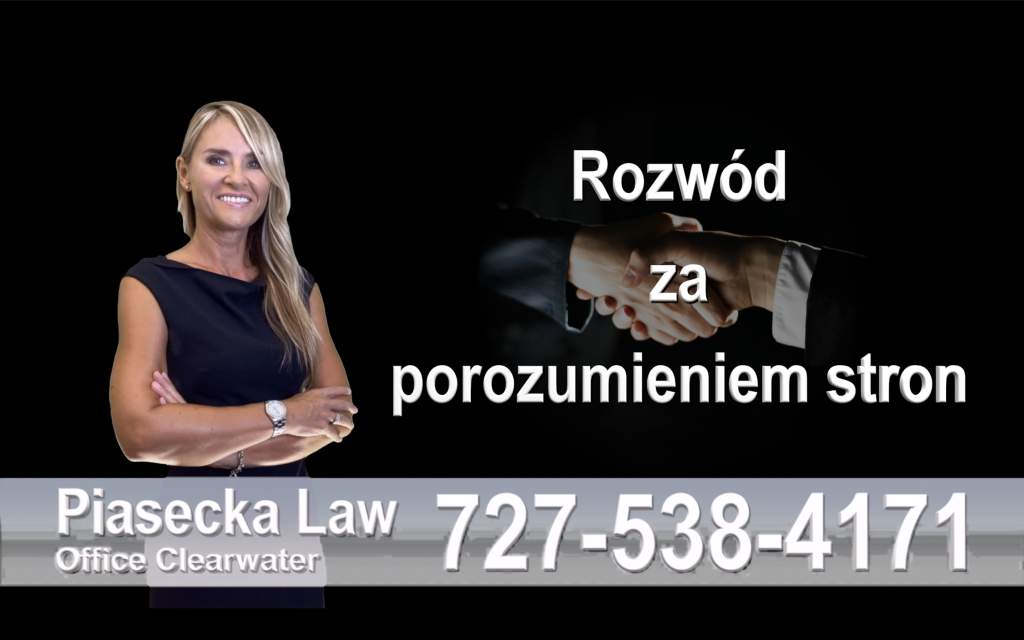Clearwater Divorce Lawyer / Attorney, Agnieszka “Aga” Piasecka
Agnieszka “Aga” Piasecka, Esq. is a Polish attorney / lawyer in Florida. Agnieszka has two Law Degrees from Poland and Florida and more than 20 years of combined experience from Poland and USA. Attorney Agnieszka Piasecka obtained her Juris Doctorate Cum Laude from Stetson University College of Law in Florida and her Masters Degree in Law with Honors from Jagiellonian University in Poland. She also studied International Law in Tilburg, Holland. Polish Attorney Agnieszka Piasecka is fluent in Polish, English and Italian and can assist you with your legal needs in Florida and Poland.
Agnieszka “Aga” Piasecka, is a divorce lawyer in Clearwater , Florida experienced in divorce, uncontested divorce, contested divorce and high-asset divorce. Clearwater lawyer Agnieszka Piasecka has the dedication, knowledge and experience needed to obtain the best possible results for her divorce clients.
Clearwater Divorce lawyer, Agnieszka Piasecka, is fluent in Polish, Italian and English and can answer your Divorce and Family Law questions regarding: Alimony, Child Support, Child Custody, Domestic Violence Injunctions, Equitable, Distribution of Property, Marital Settlement Agreements, Modification of Prior Judgments, Paternity Actions, Post Nuptial Agreements, Pre Nuptial Agreements, and Relocation in Clearwater , Florida.
Clearwater lawyer, Agnieszka Piasecka, offers FREE consultations regarding all divorce matters and offers a FLAT FEE for uncontested divorces in Clearwater , Florida.
For a FREE consultation regarding your divorce needs please call:
727-538-4171
813-786-3911
Adwokat Agnieszka “Aga” Piasecka jest polskim prawnikiem uprawnionym do praktyki prawa na Florydzie. Agnieszka Piasecka ma dwa dyplomy prawa i łącznie ma ponad 20 lat doświadczenia prawniczego z Polski i USA. Agnieszka uzyskała Doktorat Prawa z wyróżnieniem w Stetson University College of Law na Florydzie oraz Magistrat Prawa z wyróżnieniem na Uniwersytecie Jagiellońskim w Polsce. Agnieszka Piasecka studiowała również Prawo Międzynarodowe na Uniwersytecie w Tilburgu, w Holandii. Agnieszka mówi biegle po polsku, po angielsku oraz po włosku.
Agnieszka „Aga” Piasecka, jest adwokatem zajmującym się między innymi rozwodami w Clearwater na Florydzie. Agnieszka Piasecka posiada wiedzę i doświadczenie potrzebne do uzyskania jak najlepszych rezultatów dla swoich klientów.
Prawnik rozwodowy w Clearwater , Agnieszka Piasecka biegle posługuje się językiem polskim, włoskim i angielskim i może udzielić Ci porady prawnej dotyczącej prawa rodzinnego i rozwodowego w zakresie: opieki nad dziećmi, alimentów, zakazu zbliżania w przypadkach przemocy domowej, podziału majątku, porozumień małżeńskich, intercyz, modyfikacji wcześniejszych wyroków, powództw o ustalenie ojcostwa, umów po ślubie, umów przedmałżeńskich i relokacji w Clearwater na Florydzie.
Polski adwokat w Clearwater, Agnieszka Piasecka, oferuje BEZPŁATNĄ pierwszą konsultację telefoniczną.
Aby uzyskać BEZPŁATNĄ konsultację dotyczącą Twojej sprawy rozwodowej, zadzwoń:
727-538-4171
813-786-3911
FLAT FEE UNCONTESTED DIVORCE
Agnieszka Piasecka’s Client Reviews:
https://piaseckalaw.com/reviews
Divorce Lawyer Agnieszka “Aga” Piasecka has an excellent reputation in Florida and in Poland. As you can see by her reviews, Agnieszka Piasecka’s clients are consistently impressed by her performance in the courtroom and her knowledge of the law in Florida and in Poland.
Agnieszka Piasecka’s Avvo Reviews:
https://www.avvo.com/attorneys/33760-fl-agnieszka-piasecka-4581259/reviews.html
Divorce Lawyer Agnieszka “Aga” Piasecka’s Avvo Clients’ Choice Award
The independent lawyer rating service, Avvo, gave Agnieszka Piasecka its Clients’ Choice Awards for the most highly rated lawyers in the country. Avvo is a lawyer rating service that has ratings, reviews, and disciplinary records for lawyers in every state. Its purpose is to help people get legal advice, find the right lawyer, and make informed legal decisions.
How the Avvo Rating is calculated
The Avvo Rating cannot be bought. The model used to calculate the rating was developed with input from hundreds of lawyers, thousands of consumers, and many other legal professionals who deeply understand the work lawyers do. The Avvo Rating reflects the type of information people have identified as important when looking to hire a lawyer.
100+ Five Star Reviews
Selections for the Clients’ Choice award are made based on the number and quality of ratings and reviews an attorney receives by clients they have personally represented. The Clients’ Choice Award is reserved for attorneys, who receive a significant number of 5-star reviews on Avvo. Lawyer / Attorney Agnieszka “Aga” Piasecka has received more than 100 five star reviews and recommendations.
Divorce / Dissolution of Marriage Commonly Asked Questions and Answers
Q: What is collaborative law process in divorce?
Pursuant to Florida Statute 61.56(4), “Collaborative law process” means a process intended to resolve a collaborative matter without intervention by a tribunal and in which persons sign a collaborative law participation agreement and are represented by collaborative attorneys. It is a form of uncontested divorce, where the parties agree to collaborate with each other in good faith to reach an amicable dissolution of marriage.
Q: How is property divided in divorce proceeding?
A: In Florida, marital property is divided between spouses by equitable distribution.
Q: What is equitable distribution of assets?
A: Equitable distribution of assets means division of marital property in a divorce under statutory guidelines. Equitable distribution is fair but not necessarily equal division of assets and liabilities between spouses.
Q: What are the statutory guidelines for equitable distribution of property?
A: Fla. Stat. 67.075 provides for equitable distribution of marital assets and liabilities. Specifically:
“(1) In a proceeding for dissolution of marriage, in addition to all other remedies available to a court to do equity between the parties, or in a proceeding for disposition of assets following a dissolution of marriage by a court which lacked jurisdiction over the absent spouse or lacked jurisdiction to dispose of the assets, the court shall set apart to each spouse that spouse’s nonmarital assets and liabilities, and in distributing the marital assets and liabilities between the parties, the court must begin with the premise that the distribution should be equal, unless there is a justification for an unequal distribution based on all relevant factors, including:
(a) The contribution to the marriage by each spouse, including contributions to the care and education of the children and services as homemaker.
(b) The economic circumstances of the parties.
(c) The duration of the marriage.
(d) Any interruption of personal careers or educational opportunities of either party.
(e) The contribution of one spouse to the personal career or educational opportunity of the other spouse.
(f) The desirability of retaining any asset, including an interest in a business, corporation, or professional practice, intact and free from any claim or interference by the other party.
(g) The contribution of each spouse to the acquisition, enhancement, and production of income or the improvement of, or the incurring of liabilities to, both the marital assets and the nonmarital assets of the parties.
(h) The desirability of retaining the marital home as a residence for any dependent child of the marriage, or any other party, when it would be equitable to do so, it is in the best interest of the child or that party, and it is financially feasible for the parties to maintain the residence until the child is emancipated or until exclusive possession is otherwise terminated by a court of competent jurisdiction. In making this determination, the court shall first determine if it would be in the best interest of the dependent child to remain in the marital home; and, if not, whether other equities would be served by giving any other party exclusive use and possession of the marital home.
(i) The intentional dissipation, waste, depletion, or destruction of marital assets after the filing of the petition or within 2 years prior to the filing of the petition.
(j) Any other factors necessary to do equity and justice between the parties.”
Q: What is marital property?
A: Pursuant to Fla. Stat. 61.075(6)(a)1, “marital assets and liabilities” comprise of:
“a. Assets acquired and liabilities incurred during the marriage, individually by either spouse or jointly by them.
b. The enhancement in value and appreciation of nonmarital assets resulting either from the efforts of either party during the marriage or from the contribution to or expenditure thereon of marital funds or other forms of marital assets, or both.
c. Interspousal gifts during the marriage.
d. All vested and nonvested benefits, rights, and funds accrued during the marriage in retirement, pension, profit-sharing, annuity, deferred compensation, and insurance plans and programs.”
Pursuant to Fla. Stat. 61.075(8), all assets acquired and liabilities incurred during the marriage and not specifically established as nonmarital assets or liabilities are presumed to be marital assets and liabilities. Also, all real property held by the parties as tenants by entireties, whether acquired prior or during the marriage, is presumed to be marital.
Assets acquired prior to marriage are nonmarital assets and remain separate property of the owner absent evidence of a gift or conveyance of the assets to the owner’s spouse. Moss v. Moss, 829 So. 2d 302 (Fla. 5th DCA 2002).
However, property acquired during the marriage through the exchange of nonmarital assets is nonmarital. Beaty v. Gribble, 652 So. 2d 1156 (Fla. 2d DCA 1995).
Q: What is nonmarital property?
A: Pursuant to Fla. Stat. 61.075(6)(b), “nonmarital assets and liabilities” include:
“1. Assets acquired and liabilities incurred by either party prior to the marriage, and assets acquired and liabilities incurred in exchange for such assets and liabilities;
2. Assets acquired separately by either party by noninterspousal gift, bequest, devise, or descent, and assets acquired in exchange for such assets;
3. All income derived from nonmarital assets during the marriage unless the income was treated, used, or relied upon by the parties as a marital asset;
4. Assets and liabilities excluded from marital assets and liabilities by valid written agreement of the parties, and assets acquired and liabilities incurred in exchange for such assets and liabilities; and
5. Any liability incurred by forgery or unauthorized signature of one spouse signing the name of the other spouse. Any such liability shall be a nonmarital liability only of the party having committed the forgery or having affixed the unauthorized signature. In determining an award of attorney’s fees and costs pursuant to s. 61.16, the court may consider forgery or an unauthorized signature by a party and may make a separate award for attorney’s fees and costs occasioned by the forgery or unauthorized signature. This subparagraph does not apply to any forged or unauthorized signature that was subsequently ratified by the other spouse.”
Q: Is an engagement ring marital property?
A: The general rule is that an engagement ring is nonmarital property. Randall v. Randall, 56 So.3d 817 (Fla. 2d DCA 2011).
Q: What is the cut-off date for identifying marital assets?
A: In Florida, the cut-off date for determining whether or not assets and liabilities are marital is “the earliest of the date the parties enter into a valid separation agreement, such other date as may be expressly established by such agreement, or the date of the filing of a petition for dissolution of marriage. The date for determining value of assets and the amount of liabilities identified or classified as marital is the date or dates as the judge determines is just and equitable under the circumstances. Different assets may be valued as of different dates, as, in the judge’s discretion, the circumstances require.” Fla. Stat. 61.075(7).
Q: Are assets obtained after filing for dissolution of marriage marital?
A: Assets acquired by one spouse after filing for a divorce are generally deemed to be nonmarital. Beers v. Beers, 724 So.3d 388 (Fla. 2d DCA 2009).
Q: Are debts acquired by one spouse during marriage marital?
A: Generally, debts acquired by one spouse during marriage are marital. Fla. Stat. 61.075(6)(a)1.
Q: Are one spouse’s student loans marital debt if they were acquired during marriage?
A: Unfortunately, yes. Florida courts consider student loans of one spouse marital debt that should be shared equally amongst both spouses if the student loans were obtained during marriage. Rogers v. Rogers, 12 So.3d 388 (Fla. 2d DCA 2009).
Q: Can nonmarital property become marital?
A: Yes. Nonmarital property may turn to marital asset when it is commingled with marital assets (e.g. money is deposited in joint marital account). Pfrengle v. Pfrengle, 976 So.2d 1134 (Fla. 2d DCA 2008). The spouse seeking to have property declared as nonmarital asset has the burden of overcoming the presumption of gift by proving that a gift was not intended. Robertson v. Robertson, 593 So.2d 491, 494 (Fla. 1991).
Furthermore, pursuant to Fla. Stat. 61.075(6)(a)1b, a nonmarital asset may be become a marital asset to the extent that its value has been enhanced by marital funds or labor. Cole v. Robert, 661 So.2d 1156 (Fla. 2d DCA 1995). However, it has to be active appreciation in value.
Q: What is active appreciation of an asset?
A: Active appreciation occurs when one spouse’s marital efforts caused the increase in value of the asset.
Q: Is paying off the mortgage considered active appreciation?
A: The mortgage reduction may be considered an “enhancement value” subject to equitable distribution if the mortgage was partially or fully paid off during the marriage from marital funds. Stevens v. Stevens, 651 So.2d 1306 (Fla. 1st DCA 1995). When marital assets are used during the marriage to reduce the mortgage on non-marital property, the increase in equity is a marital asset subject to equitable distribution. See e.g. Gaetani-Slade v. Slade, 852 So.2d 343 (Fla. 1st DCA 2003).
Q: What is passive appreciation of an asset?
A: Passive appreciation occurs when the increase or decrease of value is a result of passive or market forces, rather than the particular actions of a spouse.
Q: Who gets a jointly held business after divorce?
A: When deciding who the closely held business goes to, the court should take into consideration the desirability of retaining an interest in a business intact and free from any claim or interference by the other party. Fla. Stat. 61.075. Generally, it is improper for the court to leave the parties as joint owners of a joint business. Ross v. Bandi, 566 So.2d 55 (Fla. 4th DCA 1990). In many situations forcing the spouses to be business partners after divorce creates an “intolerable situation” especially when the spouses clearly state that they do not want to continue working together after the divorce. Id.
Q: Who gets marital residence after divorce?
A: Whenever children are involved, usually the spouse with the majority of the timesharing is awarded exclusive use and possession of the marital home until the minor children reach the majority or become emancipated or until the former spouse remarries. See Dolch v. Dolch, 368 So.2d 618 (Fla. 2d DCA 1979).
Q: How are the assets valued in a divorce proceeding?
A: Assets are valued according to the fair market value.
Q: What is fair market value?
A: Fair market value is the price that a seller is willing to accept and a buyer is willing to pay on the open market for a similar property.
Q: Can spouses agree to a different than equitable distribution of assets?
A: Yes, the spouses can always agree to a different distribution of assets in a marital settlement agreement, prenuptial agreement or postnuptial agreement.
Q: What is a prenuptial agreement?
A: A prenuptial agreement, also called “prenup” or premarital agreement is “an agreement between prospective spouses made in contemplation of marriage and to be effective upon marriage.” Fla. Stat. 61.079.
Q: What are the formalities required for a prenuptial agreement to be valid?
A: It must be in writing and signed by both parties. Fla. Stat. 61.079.
Q: What can a prenuptial agreement contain?
A: Pursuant to the Florida Statute 61.079, the parties to a prenup may contract with each other with regards to:
- The rights and obligations of each of the parties in any of the property of either or both of them whenever and wherever acquired or located;
- The right to buy, sell, use, transfer, exchange, abandon, lease, consume, expend, assign, create a security interest in, mortgage, encumber, dispose of, or otherwise manage and control property;
- The disposition of property upon separation, marital dissolution, death, or the occurrence or nonoccurrence of any other event;
- The establishment, modification, waiver, or elimination of spousal support;
- The making of a will, trust, or other arrangement to carry out the provisions of the agreement;
- The ownership rights in and disposition of the death benefit from a life insurance policy;
- The choice of law governing the construction of the agreement; and
- Any other matter, including their personal rights and obligations, not in violation of either the public policy of this state or a law imposing a criminal penalty.
Q: Can child support be reduced by a prenuptial agreement?
A: No. The right of a child to support may not be adversely affected by a premarital agreement. Fla. Stat. 61.079.
Q: When does a prenuptial agreement become effective?
A: A premarital agreement becomes effective upon marriage of the parties. Fla. Stat. 61.079.
Q: Can a prenuptial agreement be changed or revoked?
A: Yes. A premarital agreement may be amended, revoked, or abandoned but it must be done only by a written agreement signed by the parties. Fla. Stat. 61.079.
Q: How can a prenuptial agreement be challenged?
A: Pursuant to Florida Statute 61.079, a prenup is not enforceable “if the party against whom enforcement is sought proves that:
1. The party did not execute the agreement voluntarily;
2. The agreement was the product of fraud, duress, coercion, or overreaching; or
3. The agreement was unconscionable when it was executed and, before execution of the agreement, that party:
a. Was not provided a fair and reasonable disclosure of the property or financial obligations of the other party;
b. Did not voluntarily and expressly waive, in writing, any right to disclosure of the property or financial obligations of the other party beyond the disclosure provided; and
c. Did not have, or reasonably could not have had, an adequate knowledge of the property or financial obligations of the other party.
Q: What is alimony?
A: Alimony or spousal support is defined as “an allotment of sums of money payable at regular intervals or in lump sum, as distinguished from a portion of a spouse’s estate, and it is an obligation imposed by law separate and distinct from the parties’ property rights.” Cullen v. Cullen, 413 So.2d 1196, 1198 (Fla. 1st DCA 1982). In other words, it is court-ordered money that one spouse has to pay to the other spouse for maintenance or support during the lawsuit or after the divorce.
Q: What types of alimony are available in Florida?
A: Florida Statute 61.08 recognizes 5 different types of alimony (or any combination of these forms):
- Temporary alimony
- Bridge-the-gap alimony
- Rehabilitative alimony
- Durational alimony
- Permanent alimony
Q: How does the court determine whether or not to award alimony?
A: Pursuant to Florida Statute 61.08(2)(a)-(j), income must be calculated for each party, which includes all sources of income. Income may also be imputed.
Q: How is alimony paid?
A: Pursuant to Florida Statute 61.08(1), “the court may order periodic payments or payments in lump sum or both.”
Q: Which factors does the court consider in determining the alimony award and its amount?
A: First, the court must “make a specific factual determination as to whether either party has an actual need for alimony or maintenance and whether either party has the ability to pay alimony or maintenance. If the court finds that a party has a need for alimony or maintenance and that the other party has the ability to pay alimony or maintenance, then in determining the proper type and amount of alimony or maintenance under subsections (5)-(8), the court shall consider all relevant factors, including, but not limited to:
(a) The standard of living established during the marriage.
(b) The duration of the marriage.
(c) The age and the physical and emotional condition of each party.
(d) The financial resources of each party, including the nonmarital and the marital assets and liabilities distributed to each.
(e) The earning capacities, educational levels, vocational skills, and employability of the parties and, when applicable, the time necessary for either party to acquire sufficient education or training to enable such party to find appropriate employment.
(f) The contribution of each party to the marriage, including, but not limited to, services rendered in homemaking, child care, education, and career building of the other party.
(g) The responsibilities each party will have with regard to any minor children they have in common.
(h) The tax treatment and consequences to both parties of any alimony award, including the designation of all or a portion of the payment as a nontaxable, nondeductible payment.
(i) All sources of income available to either party, including income available to either party through investments of any asset held by that party.
(j) Any other factor necessary to do equity and justice between the parties.” Fla. Stat. 61.08(2).
Q: Does it matter if my spouse cheated on me?
A: Yes. Although Florida is a non-fault state, in determination of alimony award courts “may consider the adultery of either spouse and the circumstances thereof in determining the amount of alimony, if any, to be awarded.” Fla. Stat. 61.08(1).
Q: How can I ensure that I actually receive my alimony?
A: “To the extent necessary to protect an award of alimony, the court may order any party who is ordered to pay alimony to purchase or maintain a life insurance policy or a bond, or to otherwise secure such alimony award with any other assets which may be suitable for that purpose. Fla. Stat. 61.08(3).
Q: Does the length of marriage matter in determination of alimony award?
A: “For purposes of determining alimony, there is a rebuttable presumption that a short-term marriage is a marriage having a duration of less than 7 years, a moderate-term marriage is a marriage having a duration of greater than 7 years but less than 17 years, and long-term marriage is a marriage having a duration of 17 years or greater. The length of a marriage is the period of time from the date of marriage until the date of filing of an action for dissolution of marriage.” Fla. Stat. 61.08(4).
Q: What is a short-term marriage?
A: A short- term marriage is a marriage of 7 years or shorter. Fla. Stat. 61.08(4).
Q: What is a moderate-term marriage?
A: A moderate- term marriage is a marriage greater then 7 years but shorter than 17 years. Fla. Stat. 61.08(4).
Q: What is a long-term marriage?
A: A long – term marriage is a marriage of 17 years or longer. Fla. Stat. 61.08(4).
Q: What is temporary alimony?
A: Temporary alimony is spousal support and/or suit money, which can be obtained during the divorce proceeding if a spouse can show well founded need for support and the other spouse has the ability to pay. See Vickers v. Vickers, 413 So.2d 788, 789 (Fla. 3d DCA 1982). “Throughout the pendency of a dissolution of marriage action, a party should not have consume a separate asset in order to support himself/herself in the same standard of living enjoyed during the marriage.” Byers v. Byers, 910 So.2d 336 (Fla. 4th DCA 2005).
Q: What is bridge-the-gap alimony?
A: “Bridge-the-gap alimony may be awarded to assist a party by providing support to allow the party to make a transition from being married to being single. Bridge-the-gap alimony is designed to assist a party with legitimate identifiable short-term needs, and the length of an award may not exceed 2 years. An award of bridge-the-gap alimony terminates upon the death of either party or upon the remarriage of the party receiving alimony. An award of bridge-the-gap alimony shall not be modifiable in amount or duration.” Fla. Stat. 61.08(5).
Q: What is rehabilitative alimony?
A: “Rehabilitative alimony may be awarded to assist a party in establishing the capacity for self-support through either:
1. The redevelopment of previous skills or credentials; or
2. The acquisition of education, training, or work experience necessary to develop appropriate employment skills or credentials.
(b) In order to award rehabilitative alimony, there must be a specific and defined rehabilitative plan which shall be included as a part of any order awarding rehabilitative alimony.
(c) An award of rehabilitative alimony may be modified or terminated in accordance with s.61.14 based upon a substantial change in circumstances, upon noncompliance with the rehabilitative plan, or upon completion of the rehabilitative plan.” Fla. Stat. 61.08(6).
Q: What is durational alimony?
A: “Durational alimony may be awarded when permanent periodic alimony is inappropriate. The purpose of durational alimony is to provide a party with economic assistance for a set period of time following a marriage of short or moderate duration or following a marriage of long duration if there is no ongoing need for support on a permanent basis. An award of durational alimony terminates upon the death of either party or upon the remarriage of the party receiving alimony. The amount of an award of durational alimony may be modified or terminated based upon a substantial change in circumstances in accordance with s. 61.14. However, the length of an award of durational alimony may not be modified except under exceptional circumstances and may not exceed the length of the marriage.” Fla. Stat. 61.08(7).
Q: What is durational alimony?
A: “Permanent alimony may be awarded to provide for the needs and necessities of life as they were established during the marriage of the parties for a party who lacks the financial ability to meet his or her needs and necessities of life following a dissolution of marriage. Permanent alimony may be awarded following a marriage of long duration if such an award is appropriate upon consideration of the factors set forth in subsection (2), following a marriage of moderate duration if such an award is appropriate based upon clear and convincing evidence after consideration of the factors set forth in subsection (2), or following a marriage of short duration if there are written findings of exceptional circumstances. In awarding permanent alimony, the court shall include a finding that no other form of alimony is fair and reasonable under the circumstances of the parties. An award of permanent alimony terminates upon the death of either party or upon the remarriage of the party receiving alimony. An award may be modified or terminated based upon a substantial change in circumstances or upon the existence of a supportive relationship in accordance with s.61.14.” Fla. Stat. 61.08(8).
Q: Can the court order alimony to be paid through depository?
A: “If there is no minor child, alimony payments need not be directed through the depository. If there is a minor child of the parties and both parties so request, the court may order that alimony payments need not be directed through the depository.” Fla. Stat. 61.08(10)(c)-(d).
Q: What is permanent alimony?
A: “Permanent alimony may be awarded to provide for the needs and necessities of life as they were established during the marriage of the parties for a party who lacks the financial ability to meet his or her needs and necessities of life following a dissolution of marriage.” Fla. Stat. 61.08(8). Generally, permanent alimony may be appropriate upon consideration of statutory factors in a long-term marriage of 17 years and more. See generally Levy v. Levy, 900 So.2d 737 (Fla. 2d DCA 2005). In moderate-term marriage, permanent alimony is allowed upon clear and convincing evidence and consideration of statutory factors. Id. Permanent alimony is not appropriate in short-term marriage absent exceptional circumstances. Id.
Q: What is lump sum alimony?
A: Lump sum alimony is a payment of specific amount of spousal support paid at once or in installments. Lump sum alimony can also be awarded to ensure that property acquired throughout marriage is equitably divided.
Q: When is alimony awarded?
A: In every request for alimony, the requesting spouse must proof her/his need for alimony and the other spouse’s ability to pay. Fla. Stat. 60.08(2). In Canakaris v. Canakaris, 382 So.2d 1197 (Fla. 1980), the Supreme Court held that both above factors must be present in order for any alimony to be awarded. When determining need, the court should consider the spouses’ earning ability, age, health, education, the duration of the marriage, and the standard of living during the marriage. Quinones v. Quinones, 84 So.3d 1101 (Fla. 3d DCA 2012). Ability to pay is established based on income available to the spouse. See Zold v. Zold, 911 So.2d 1222 (Fla. 2005). In Williams v. Williams, 10 So. 3d 651, 652 (Fla. 5th DCA 2009), the court reasoned that alimony awards should leave the paying spouse with significantly less income that the net income of the receiving spouse. In Hoffman v. Hoffman, 127 So.3d 863 (Fla. 2d DCA 2013), the trial court erred in ordering the husband to pay child support, temporary alimony and temporary attorney’s fees and costs totaling more than 80% of the husband’s net monthly income.
Q: Can I seek alimony during marriage without filing for a divorce?
A: Yes. Pursuant to Florida Statue 61.09, “If a person having the ability to contribute to the maintenance of his or her spouse and support of his or her minor child fails to do so, the spouse who is not receiving support may apply to the court for alimony and for support for the child without seeking dissolution of marriage, and the court shall enter an order as it deems just and proper.”
Clearwater Divorce Lawyer / Attorney, Agnieszka “Aga” Piasecka
Clearwater Divorce Lawyer Agnieszka Piasecka is fluent in Polish, Italian and English and can answer these and many other Divorce and Family Law questions regarding: Alimony, Child Support, Child Custody, Domestic Violence Injunctions, Equitable, Distribution of Property, Marital Settlement Agreements, Modification of Prior Judgments, Paternity Actions, Post Nuptial Agreements, Pre Nuptial Agreements, and Relocation in Clearwater , Florida.
Agnieszka “Aga” Piasecka is a divorce lawyer in Clearwater , Florida experienced in divorce, uncontested divorce, contested divorce and high-asset divorce. Clearwater lawyer Agnieszka Piasecka has the dedication, knowledge and experience needed to obtain the best possible results for her divorce clients.
Clearwater lawyer Agnieszka Piasecka offers FREE consultations regarding all divorce matters and offers a FLAT FEE for uncontested divorces in Clearwater, Florida. For a FREE consultation regarding all of your divorce needs please call Clearwater lawyer Agnieszka Piasecka.
727-538-4171
813-786-3911
Divorce Lawyer Agnieszka Piasecka’s other areas of practice include: / Agnieszka zajmuje się między innymi następującymi sprawami:
- Wills and Trusts / Estate Planning / Testamenty i Trusty
- Living Wills / Testamenty dotyczące decyzji medycznych
- Real Estate Law / Prawo Nieruchomości
- Family Law / Divorce / Adoptions / Prawo Rodzinne/Rozwody/Adopcje
- Immigration Law / Prawo Imigracyjne
- Personal Injury Law / Wypadki drogowe/Odszkodowania
- Traffic Violations / Traffic Tickets / Mandaty drogowe
- Business Entities Formation / Zakładanie firm i korporacji
- Contracts / Kontrakty
*The information stated on this website is intended for educational purposes only and shall not constitute legal advice / Informacje zawarte na tej stronie służą celom edukacyjnym i nie stanowią porady prawnej










